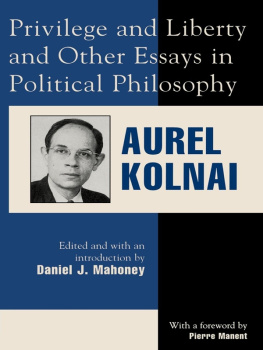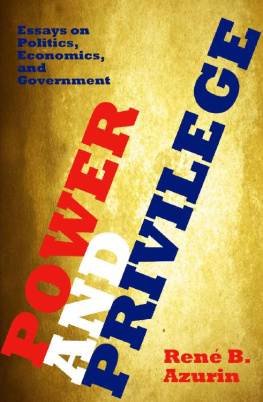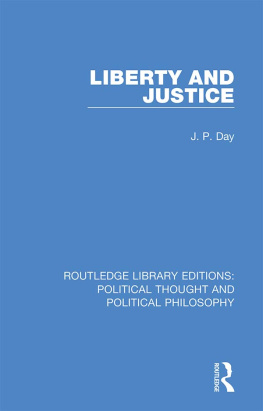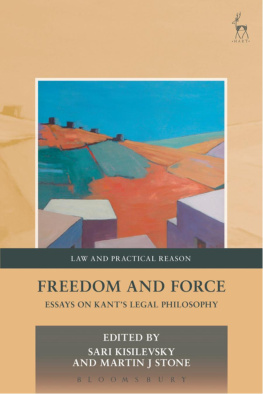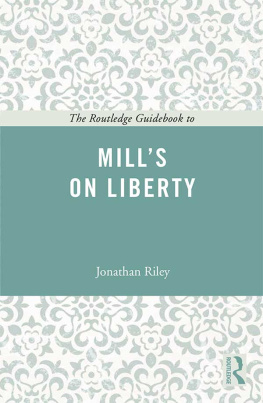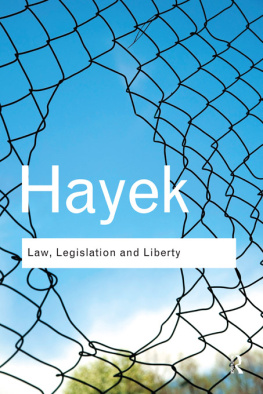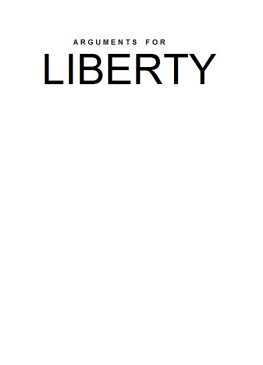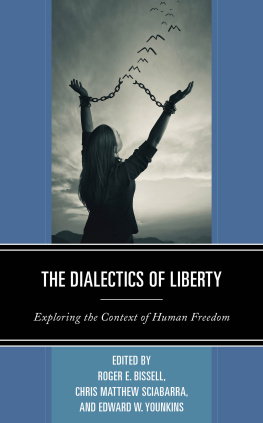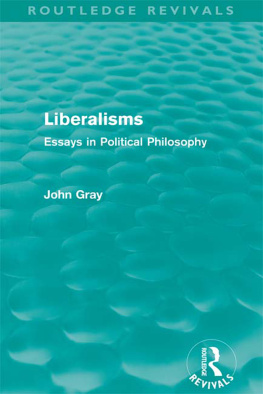Kolnai - Privilege and Liberty and Other Essays in Political Philosophy
Here you can read online Kolnai - Privilege and Liberty and Other Essays in Political Philosophy full text of the book (entire story) in english for free. Download pdf and epub, get meaning, cover and reviews about this ebook. year: 2013, publisher: Lexington Books, genre: Science. Description of the work, (preface) as well as reviews are available. Best literature library LitArk.com created for fans of good reading and offers a wide selection of genres:
Romance novel
Science fiction
Adventure
Detective
Science
History
Home and family
Prose
Art
Politics
Computer
Non-fiction
Religion
Business
Children
Humor
Choose a favorite category and find really read worthwhile books. Enjoy immersion in the world of imagination, feel the emotions of the characters or learn something new for yourself, make an fascinating discovery.
Privilege and Liberty and Other Essays in Political Philosophy: summary, description and annotation
We offer to read an annotation, description, summary or preface (depends on what the author of the book "Privilege and Liberty and Other Essays in Political Philosophy" wrote himself). If you haven't found the necessary information about the book — write in the comments, we will try to find it.
Kolnai: author's other books
Who wrote Privilege and Liberty and Other Essays in Political Philosophy? Find out the surname, the name of the author of the book and a list of all author's works by series.
Privilege and Liberty and Other Essays in Political Philosophy — read online for free the complete book (whole text) full work
Below is the text of the book, divided by pages. System saving the place of the last page read, allows you to conveniently read the book "Privilege and Liberty and Other Essays in Political Philosophy" online for free, without having to search again every time where you left off. Put a bookmark, and you can go to the page where you finished reading at any time.
Font size:
Interval:
Bookmark:
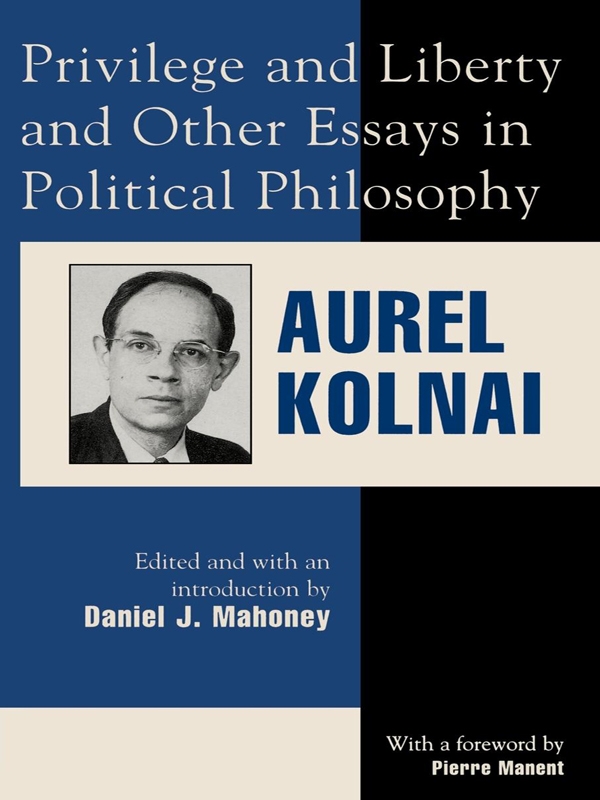
Aurel Kolnai (1900-1973) was a distinguished moral and political philosopher. He was born in Budapest and lived in Austria, Germany, France, the United States, and Canada before settling in England in 1955. From 1959 to 1973, he was visiting lecturer in philosophy at Bedford College, London. His books include The War Against the West (1938), Ethics, Value and Reality (1977), The Utopian Mind and Other Papers (1995), and Political Memoirs (1999).
Daniel J. Mahoney is associate professor of political science at Assumption College in Worcester, Massachusetts. He is author of The Liberal Political Science of Raymond Aron (1992) and DeGaulle: Statesmanship, Grandeur and Modem Democracy (1996) and editor and author of an introductory essay to Pierre Manent, Modem Liberty and Its Discontents (1998). He is currently completing a book on the political thought of Aleksandr Solzhenitsyn.
The cult of the Common Man and the corresponding hatred of Privilege constitute the classic ideological bridges, connecting-links, or portages as it were, between equalitarian progressive Democracy and Communismor to put it with greater precision, from Democracy to Communism. The principle of social levelling and monism they express (in the language fashionable to-day) is what underlies the logic of that final and suicidal surrender of Democracy to Communism which powerful forces in the midst of our society are seeking to bring about: a surrender to be experienced, at the same time, as a dialectical self-fulfillment, an historical consummation, a self-transcending apotheosis of Democracy. Those among us who object to Communism radically and essentially, on principle and not merely on tactical and temporary grounds or by reason of psychological inhibitions,a handful of men only, perhaps, in an actual but very many more in a virtual sense, seeing that the plain or ordinary man, a far more real creature than the Common Man which is a construct of subversive sophists and seekers for power, cannot but dread Communism as the blighting tyranny it is, though in default of any intelligent leadership in resistance he may be inclined to submit to it half-heartedly,true and integral anti-communists, in a word, should not only abstain from verbal celebrations of the idol of the Common Man but actively set about its destruction, and not merely subdue their voices when joining in the ritual chorus of abuse against Privilege but make bold to demand and to acclaim a downright philosophical apologia of Privilege in regard to both the frail remnants of it that have survived to this day and the more vital new types of it which, we trust, will emerge again in more civilized epochs to come. Nor should they suffer to be deterred from their task by the allegation of the Marxists and their progressive flunkeys, mendacious in its spirit but not altogether false in its substance, that whoever opposes Communism relentlessly must inevitably oppose Democracy itself in a certain sense and to a certain degree; that whoever fails to worship the Common Man and to abhor Privilege is ineluctably tainted with heresy concerning such fundamental dogmas as that of Equality and The Peoples Will.
In serene impassivity towards all tactical preoccupations in our own minds and all psychological stratagems of the Enemy, then, not swerving from our path either in the directions of Liberal compromise and diplomacy or in those of reactionary aestheticism or Fascist hysteria (which under a Rightist flag tends to oppose Leftist totalitarianism by a noisy and ineffectual caricature thereof), let us inquire into the meaning of the dominant theme in the process that surrounds and threatens to submerge us: the theme of The Common Man versus Privilege.
Again, our enquiry must not be guided by any arbitrary and particularist group bias, in favour of this or that still-powerful or menaced or ci-devant oligarchy, that is to say; from our main argument, we may draw sympathetic applications to any or all of these, but in a secondary and accidental sense only: neither a relationship of being commandeered nor one of sentimental piety, for instance, must oblige us towards Western capitalists, Prussian junkers, or any suchlike things. The Marxian adversary, of course, will say (and has to say) that we cannot but be so commandeered and committed; but we must, with a view to safe-guarding our intellectual honesty, diligently train ourselves to mind such reflex sounds of his no more than the buzzing of a moth, indeed not to give them a moments attention. Thus, if The Common Man versus Privilege were meant to express the evident objective truthwhich in fact it is deceitfully intended to suggest and to evokethat a great multitude of people as such, in regard to its rights, interests, welfare, security, perfection, and so forth, is more important than a tiny minority of people as such, we should indeed have to side (as philosophers and citizens or Christians, at least ) unequivocally with the Common Man as against Privilege; the objection that we are somehow specifically tied up with the tiny minority in question would be, even though a true description of our state of consciousness, altogether invalid as an objection. To put it in different terms, if the Common Man stands for the Common Good, and if Privilege means simply what is good for the privileged few and accordingly bad for the underprivileged or the disinherited masses, we in these pages have no case at all. Of course, the contention reposes on baseless presuppositions concealed by the verbal sleight of hand of contrasting a great number simpliciter with a small number simpliciter.
The false presuppositions we have in mind are, roughly, threefold in nature. The first is the most obvious and the easiest to lay bare; the second consists in a classic equivocation about justice, which has worked immense harm; the third, more recondite, carries usonce we have seen through itstraight to the core of the matter.
First, we have the fallacy of class conflict in the broadest sense of the term: the error that goods, generally and universally, cannot be other than goods for consumption in the strictest and narrowest meaning of the word; that, therefore, the possession of one man necessarily and exactly corresponds to the want of another, and that what is given to one group of people is by definition taken away from another. In other words again, the problem of the good life (along with history, politics, and culture) revolves round the number and the size of the slices of cake falling to this or to that other person, or collective taken as a unit in its contest with other collectives. In sane philosophy, the father is primarily the person who provides for the children (having, incidentally, engendered them and placed them in the fabric of an ordered life); in the insane philosophy of Subversion, the father is primarily the class enemy or exploiter who carves out for himself the largest piece of meat off the common joint.
Secondly, then, the slices or pieces or rations should all be equal per capita ; or again, if not arithmetically equal, at least strictly proportioned to everybodys contribution towards their productionthe proportion being measured by the amount of labour or some other evident test. This must be so under pain of injustice, by which is meant a breach of the social contract which allegedly regulates all (or all but private and intimate) relations between individuals. If my neighbour owns a larger property or inhabits a larger house than I, he has stolen it from me: it is as though he had defrauded me when dividing up between us, on equal terms as had been stipulated, the possession referred to. Or again, it may be lawful for him to own more and to live on a larger scale: but this can be so on the condition only, and only so long as he can prove at any moment before the tribunal of mankinds actualized consciousnessof Descartess ides claires et distinctes, or of Kants Bewusstsein berhaupt , perhapsthat his greater capacity of work or at any rate his appreciable surplus of creative genius (useful in terms of needs revealed by the market or decreed by the competent Department of the Bureau of Human Consciousness) confers upon him the right of owning and enjoying, say, half as much again as I do. Otherwise, he is a leper sundered from the body of common men, an outcast blighted with the sin of privilege; whereas I the common man go afflicted with a grievous wrong, am curtailed of my rights, and am indeed not only entitled but obliged to concentrate all my thoughts and efforts on obtaining redress (not without a vengeance, to be sure). The fallacy is manifest enough; the legitimate moral problem of equality and inequality in social relationships is not, of course, settled therewith, but need not detain us longer at this stage.
Font size:
Interval:
Bookmark:
Similar books «Privilege and Liberty and Other Essays in Political Philosophy»
Look at similar books to Privilege and Liberty and Other Essays in Political Philosophy. We have selected literature similar in name and meaning in the hope of providing readers with more options to find new, interesting, not yet read works.
Discussion, reviews of the book Privilege and Liberty and Other Essays in Political Philosophy and just readers' own opinions. Leave your comments, write what you think about the work, its meaning or the main characters. Specify what exactly you liked and what you didn't like, and why you think so.

